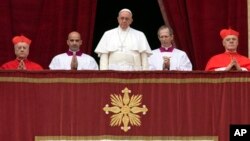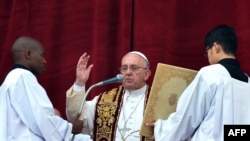After a particularly violent week leading up to the Christmas holiday, world leaders used their yearly holiday messages to heal and speak out against injustices.
Bells at the Church of the Nativity summoned the faithful to Mass in Bethlehem, where Christians believe Jesus Christ was born.
The Latin Patriarch of Jerusalem, Fouad Twal, the top Roman Catholic official in the Holy Land, led a Christmas Eve midnight Mass as hundreds of worshippers prayed in the Nativity Church.
In his Christmas Eve message, Patriarch Twal urged Jews, Muslims and Christians to live in peace in the Holy Land.
At the Vatican, Pope Francis on Thursday called for peaceful resolution of a series of other conflicts, including Ukraine, Libya, South Sudan, the Central African Republic and various regions of the Democratic Republic of the Congo.
The pope also offered sympathy for the victims of the Ebola epidemic, citing above all Liberia, Sierra Leone and Guinea, and also the families of the children killed in an attack on a school in Peshawar, Pakistan, last week that left an estimated 150 people dead, the vast majority children.
Christmas celebrations lifted spirits after a year of conflict and failed peace efforts in the region.
Stephana Zecevic, who was visiting Bethlehem from Belgrade, Serbia, said, “It was very spiritual for me and wonderful — giving, sharing, really beautiful. I can feel the Christmas spirit. I felt really blessed, and I’m very happy that I’m here.”
It was a low turnout this Christmas in the wake of the 50-day war between Israel and the Palestinian militant group Hamas in the Gaza Strip. A cease-fire has mostly held since the violence ended four months ago, but tourism to the Holy Land has not recovered.
Fragile economy
Palestinians in Bethlehem are disappointed by the lack of tourists, which is a blow to the city’s fragile economy.
Bethlehem Mayor Vera Baboun said the root of the problem is Israel’s occupation of the West Bank and Gaza.
“The main message is: All I want for Christmas this year is justice, and if there is justice, there is peace,” Baboun said.
President Barack Obama and his wife, Michelle, sent Christmas and New Year holiday greetings to all Americans, with a special message of thanks to U.S. troops for their service to the country.
The Obamas recorded the Christmas message, which was released Wednesday, before the family left for a holiday in Hawaii.
The Obamas thanked troops, military families and veterans for their service and urged all Americans to express their gratitude to the armed forces by "giving back" through community service.
The president also said that the birth of Jesus was a message to love one another and reach out to the sick, the hungry and the troubled.
Obama enjoyed a Christmas Eve dinner Wednesday with his family and telephoned members of each branch of the U.S. armed forces to express his gratitude for their sacrifice. He also planned to visit a Marine base in Kaneohe Bay to visit with servicemen and women.
The Pentagon said Defense Secretary Chuck Hagel also telephoned four selected service members to thank them for giving up their holiday to serve. Two were in Afghanistan and two were with the U.S. Central Command, which is leading the coalition fight against the Islamic State group.
In Afghanistan, U.S. troops celebrated Christmas Day with song and dance. “Tops in Blue,” a touring performance ensemble, put on a festive show at the Bagram Airbase for troops from the NATO-led International Security Assistance Force.
Reconciliation theme
In Britain, Queen Elizabeth II’s Christmas message spoke of reconciliation and gave thanks for health care workers helping to fight the Ebola outbreak in West Africa.
The queen referred to the independence referendum in September in Scotland, which ended up not breaking away from the United Kingdom. Her message urged healing between the two camps.
“Of course, reconciliation takes different forms. In Scotland, after the referendum, many felt great disappointment, while others felt great relief, and bridging these differences will take time,” she said.
The queen also said she was "deeply touched" by the "selflessness" of doctors and nurses combating the Ebola outbreak.
Each year, the queen writes her own Christmas speech, which is prerecorded and televised in many parts of the world on the afternoon of Christmas Day.
Remembering a hard year
Less than two weeks ago in Australia, a gunman took more than a dozen people hostage in a Sydney cafe. After a 16-hour standoff, police entered the cafe after hearing gunfire. Two hostages and the gunman were killed.
Prime Minister Tony Abbott urged Australians to remember not only the families of the victims but others who have had a hard year as well, including soldiers abroad and farmers dealing with drought.
"The last fortnight has been a heartbreaking time for our country," Abbott said in a video message. "The thoughts and prayers of everyone are with those who are grieving this Christmas."
German President Joachim Gauck used his annual Christmas address to urge his countrymen to welcome with open arms the hundreds of thousands of people fleeing war zones and to reject anti-immigrant populism.
In a broadcast released Thursday, Gauck praised Germans who sheltered and supported about 200,000 new refugees this year and to indirectly attack a new anti-asylum movement. More than 17,000 people took part in Germany's largest anti-immigrant rally on Monday in the eastern city of Dresden to air their claims that Germany is being overrun by Muslims.
"If our eyes are wide with fear, answers are hard to find," Gauck said after the grass-roots movement that calls itself PEGIDA — or Patriotic Europeans Against the Islamization of the West — staged its 10th straight weekly rally on Monday.
Missing holiday spirit
In Donetsk, a pro-Russian rebel stronghold in eastern Ukraine, hundreds of people gathered for the traditional unveiling of a tree decorated with lights ahead of the New Year holiday. Christmas is celebrated on January 7 in Ukraine, an Orthodox Christian country.
Children recited poems on a stage in Lenin Square and Russian pop music blared from loudspeakers as an inflatable snowman bobbed in the cold wind, but the Christmas spirit was missing.
After eight months of fighting between government forces and Russian-backed rebels that has torn the region apart and left more than 4,700 dead, people admitted they were not feeling too joyful.
"If I have any sense of a holiday mood, then it is buried very deep down," Svetlana Mashilina, standing next to her husband, Vladimir, told the French news agency AFP.
"It's difficult in this situation, as it can be calm one minute but then the next you'll hear an explosion somewhere," said the stocky local. "But I guess if you can't smile or laugh, then what's the point in being alive?"
Thanks to a lull in fighting since a fresh cease-fire was announced earlier this month, a semblance of normal life has returned to the streets of the battle-weary town.
Lamenting Christians' plight
Israel Prime Minister Benjamin Netanyahu wished Christians the world over a Merry Christmas on Thursday, lamenting the plight of Middle East Christians, who he said are subject to persecution in every country of the region, except for Israel.
"I wish Christians in Israel and all over the world a very Merry Christmas," Netanyahu said in the YouTube video.
He called on the world's Christian communities to remember those who are less fortunate, the Christians suffering from persecution across the Middle East.
Turkish President Recep Tayyip Erdogan used his Christmas greeting to highlight tolerance in Turkey.
His message, released Wednesday by the Presidency Press Center, read in part, "Throughout history, Anatolia has been a land where different religions, cultures and ethnicities have lived together and where racism, discrimination, animosity or hatred have never found a fertile soil to grow. … As we have always lived together in unity and solidarity throughout history, we shall continue to regard the diversities in our country as a source of richness; and we shall build up the future together on the basis of respect for each other.”
In Spain, King Felipe VI delivered a Christmas Eve address at Zarzuela palace in Madrid, using his first holiday address to lash out against corruption. However, Felipe made no direct mention of his sister Cristina de Borbon, who was ordered Monday to stand trial on tax-fraud charges.
In Berlin, dozens of swimmers arrived Thursday at the city’s Oranke Lake for their annual Christmas Day dip, complete with red Christmas hats.
The air temperature was 5 degrees C (41 F) for the Berlin Seals' outing. Swimmer Beate Korehnke told the Associated Press: “The best is the feeling afterward. There is prickling all over the body — it's like a sauna but backward.”
Iran’s Christian minority — most of Armenian ethnicity and adherent to the Gregorian faith — also celebrated Christmas, gathering at St. Mary’s Church on Christmas Eve in Tehran.
Putin cancels New Year's break
While Russia woke up on Christmas Day to its first heavy snowfall of the year, with white snow blanketing much of the country, President Vladimir Putin told government officials to scrap New Year’s holiday plans.
Russian company workers are given holiday from January 1 through January 12, when Russians celebrate the New Year, as well as Orthodox Christmas.
But with the country facing a still-unfolding economic crisis, Putin told a televised government session on Thursday that Cabinet ministers should not take this time off. "For the government, for your agencies, we cannot afford this long holiday, at least this year," he said, according to the AP.
Russia's economy, battered by low oil prices and Western sanctions, is set to enter recession next year for the first time in six years, while the ruble is now worth less than half of its value. The Russian Central Bank also announced Thursday that the country's currency reserve has dropped below $400 billion for the first time since August 2009, as the government has been selling the currency on the market to support the ruble.
VOA's Robert Berger contributed to this report from Jerusalem. Some information for this report came from Reuters, AFP and AP.


